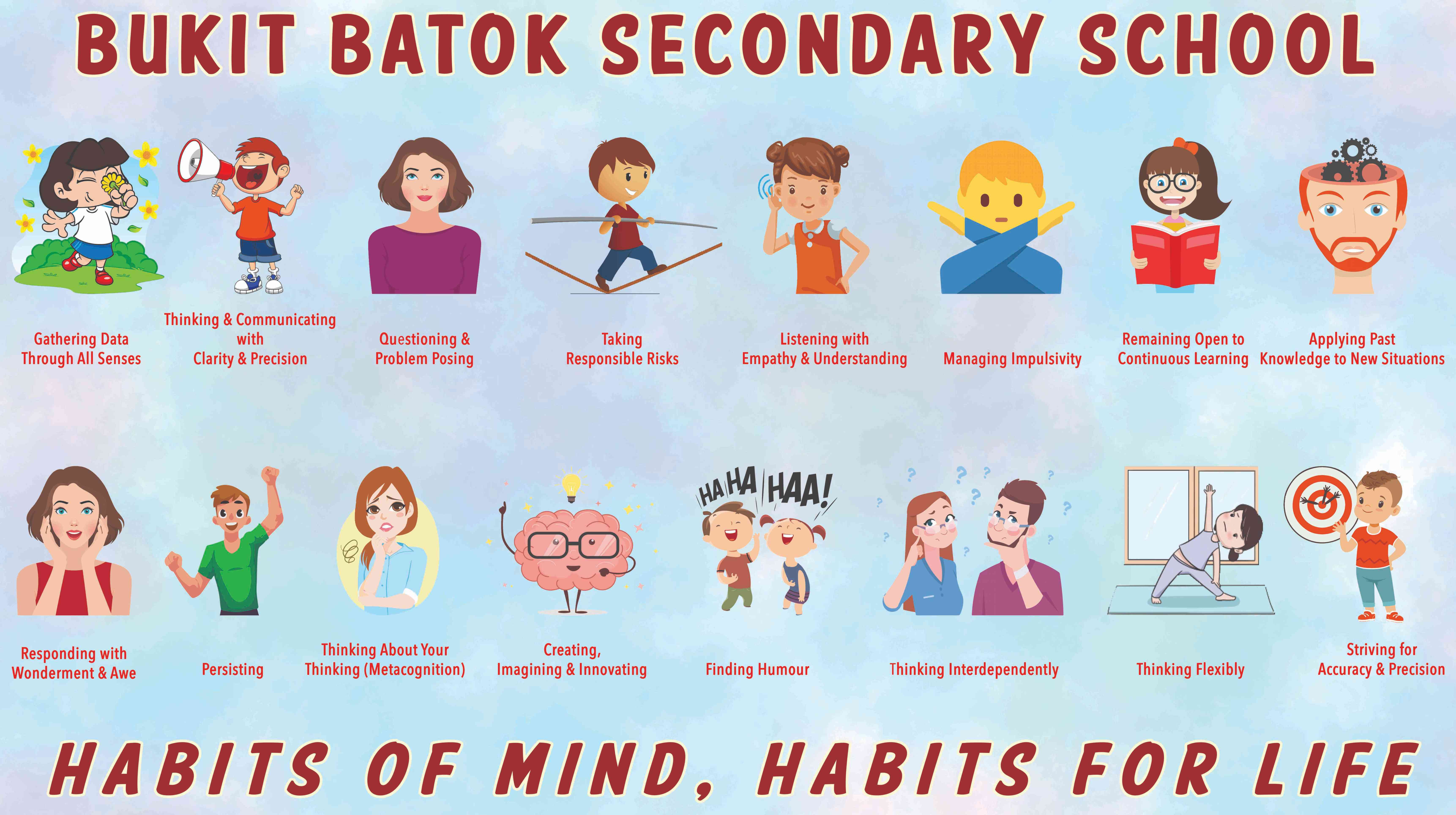Habits of Mind
Habits of Mind
Click the links for more information on:
Background
Habits of Mind (HOM) enable students to behave intelligently when they do not know the answer or when they are faced with challenging situations. HOM will equip our students holistically for the challenges of the 21st century. It helps to develop a thirst for questioning and searching, within and outside the classroom. In particular, HOM inculcates good learning habits and thinking dispositions so that our students can become self-directed, life-long learners.
Habits of Mind are for all students regardless of their level and stream. It is not meant just for those who are academically inclined.
HOM was first introduced to BBSS in January 2003. BBSS has adopted a whole school approach in introducing and implementing HOM since then. BBSS was awarded the niche status for PETS (Promoting Effective Thinking Strategies) in 2013.
HOM lessons are explicitly taught to all lower secondary students and also infused in other areas such as VIA, CCA and camps. In recognition of students who have been practicing HOM dispositions in their daily lives, identified students are affirmed as HOM-grown Stars. Through this process of nominating each other who are practicing habits of mind, students will be imbued to practice these habits more consciously. Find out more about our HOM-grown stars in Semester 1 and Semester 2.
The 16 Habits

Development of HOM in BBSS
2003 – DISCOVERING & EXPLORING STAGE Capacity Building of Staff
BBSS focused on capacity building of staff in preparation for the implementation of HOM. Fortnightly in-house training was conducted for all teaching staff. At the end of 2003, eleven teachers were identified to go for Overseas HOM Learning Trips to different schools in USA, Hong Kong and Australia. These schools were at different stages of implementing Habits of Mind.
2004 – ACTIVATING & ENGAGING STAGE Implementation of HOM for students & Creating the Environment for HOM
HOM was infused in both the academic and non-academic curriculum for both the lower and upper secondary. For the lower secondary, HOM was explicitly taught. Explicit teaching packages were created in-house, spearheaded by the 11 Core Committee Members.
Focus was given to put up HOM posters all around the school to act as reminders as well as to create the awareness for HOM.
2005 & 2006 – ACTIVATING & ENGAGING, ASSESSING & REPORTING STAGE
Further refinements were made to the original Explicit Teaching Packages. Rubrics and more reflection templates were included for self & peer assessment and reflections. Infusion of HOM was more actively carried out. Opportunities for the application of HOM were created. On-going staff training was conducted in-house for new teachers.
At the end of 2006, a HOM Revisit was conducted with the whole staff to revisit the rationale for implementation of HOM in BBSS. The revisit provided a platform for staff to take stock of how far we have come since our Journey of Implementation of HOM began in 2003. Staff made use of this opportunity to provide input on how to bring the implementation of HOM to the next level.
Many institutions both locally and overseas came to know of BBSS’s involvement in HOM. Soft copies of HOM Explicit Teaching Packages were made available on the BBSS Website.
Current Status
Habits are never fully mastered, though they do become increasingly apparent over time. Repeated opportunities provided for students to practice and reflect on their performance are needed for them to acquire these habits. The entire staff must dedicate itself to teaching, recognizing, reinforcing, discussing, reflecting and assessing the habits. Teachers always have to be on the alert to seize opportunities to engage, reinforce, illuminate, and practice the habits of mind. In order to internalize, generalize and habituate, these habits must also be reinforced and modeled at home.
Infusing the habits of mind into the school involves a special effort to “re-culture” the school. We are still continuing to experiment, refine and look for new avenues to infuse the habits of mind.
Please visit http://www.habitsofmindinstitute.org/ for more information on ‘What are Habits of Mind’. A detailed write-up entitled ‘Describing 16 Habits of Mind’ by Arthur L. Costa, Ed.D. and Bena Kallick, Ph.D. in pdf format is available there.

